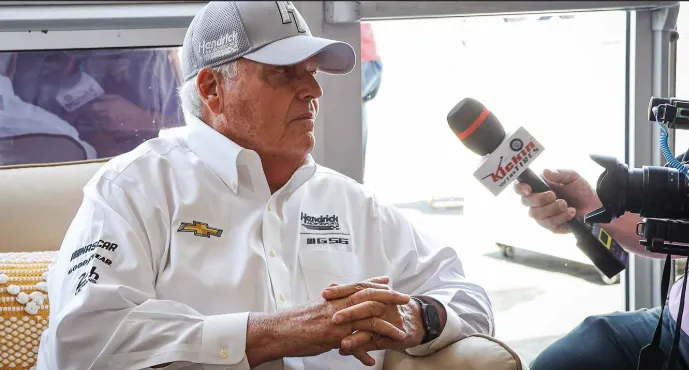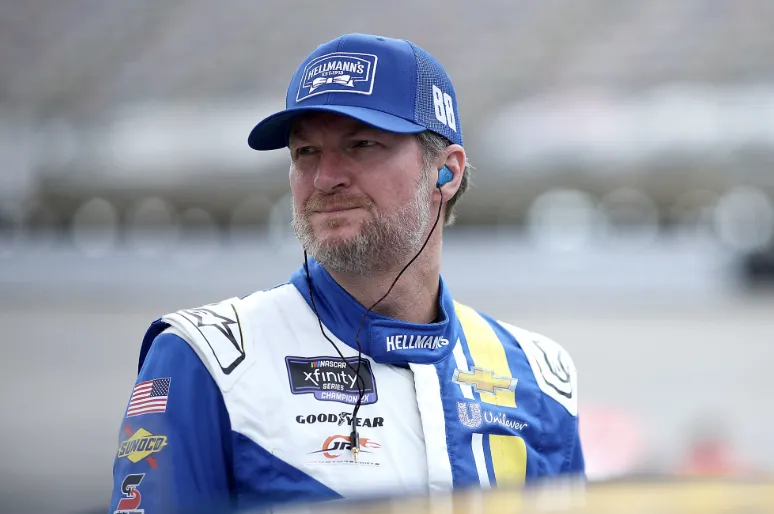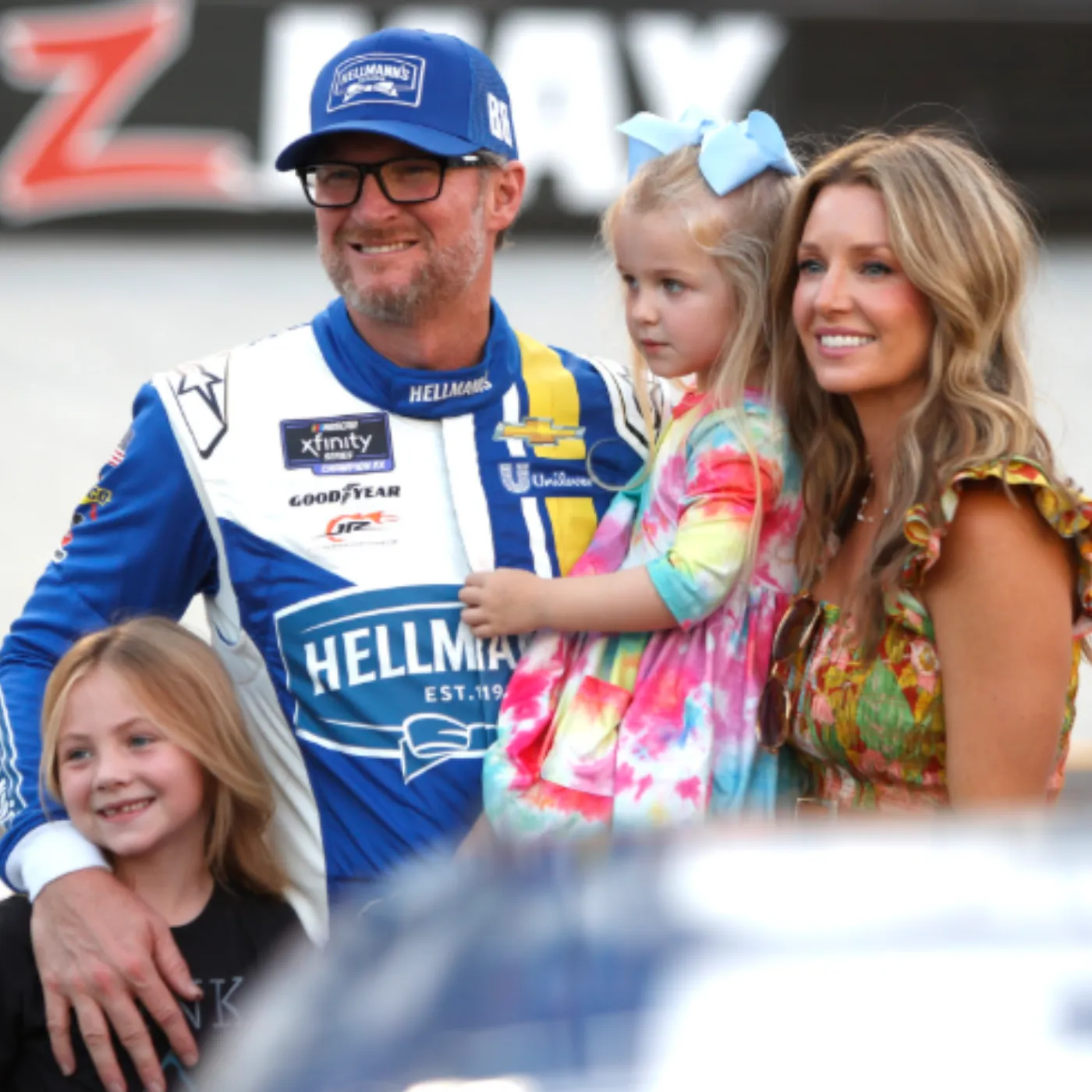
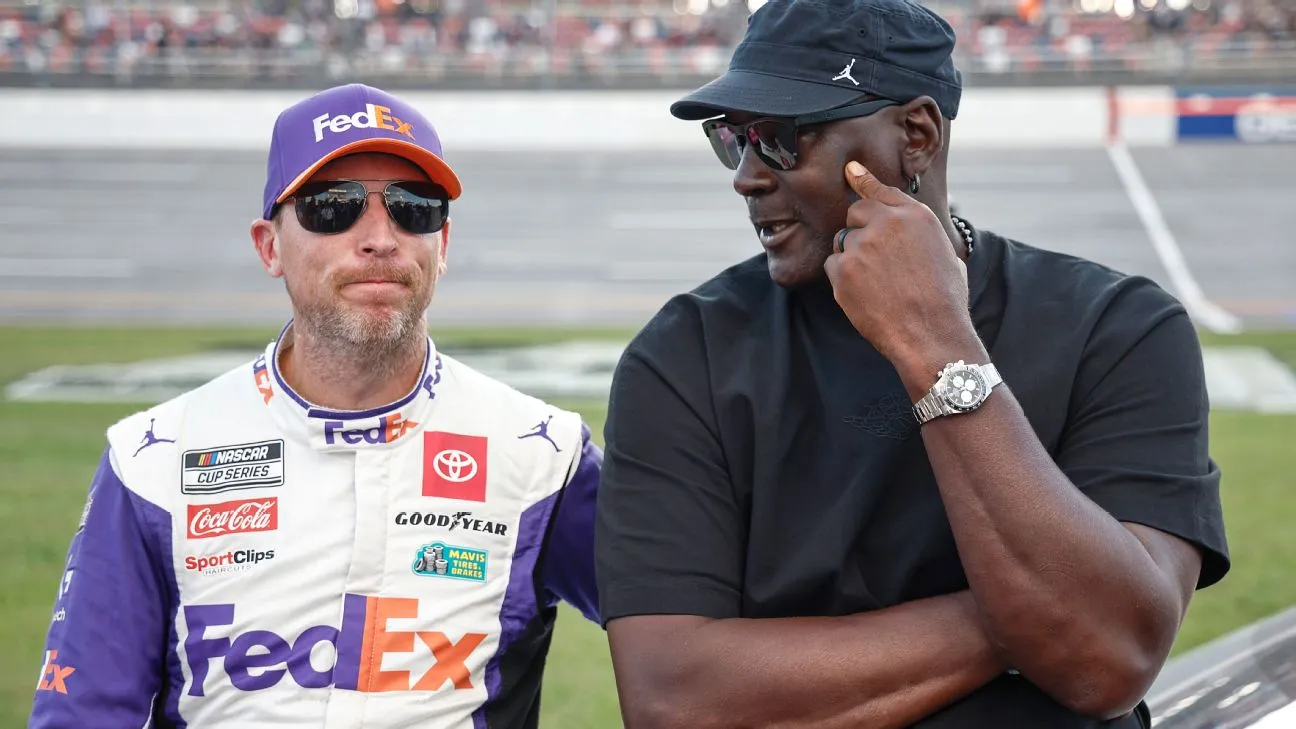
What’s REALLY Going On With 23XI and Front Row?!” – NASCAR Just Got Dragged Into Court Over a Shocking Twist
Just when fans thought the 2025 NASCAR season couldn’t get any wilder, two of its most prominent teams — including one backed by basketball icon Michael Jordan — have detonated a legal bombshell that could change the sport forever. In an unprecedented move, 23XI Racing and Front Row Motorsports have taken NASCAR to federal court, accusing the league of monopolistic practices and coercion. What triggered this explosive showdown? The answer lies in a secretive system that controls billions in revenue — and now, the battle lines are drawn.
A Franchise War Ignites: NASCAR Teams Launch Legal Blitz
In a stunning and escalating legal battle, 23XI Racing (co-owned by NBA legend Michael Jordan and NASCAR star Denny Hamlin) and Front Row Motorsports have filed a federal antitrust lawsuit against NASCAR itself — a move that has thrown the stock car world into complete chaos.
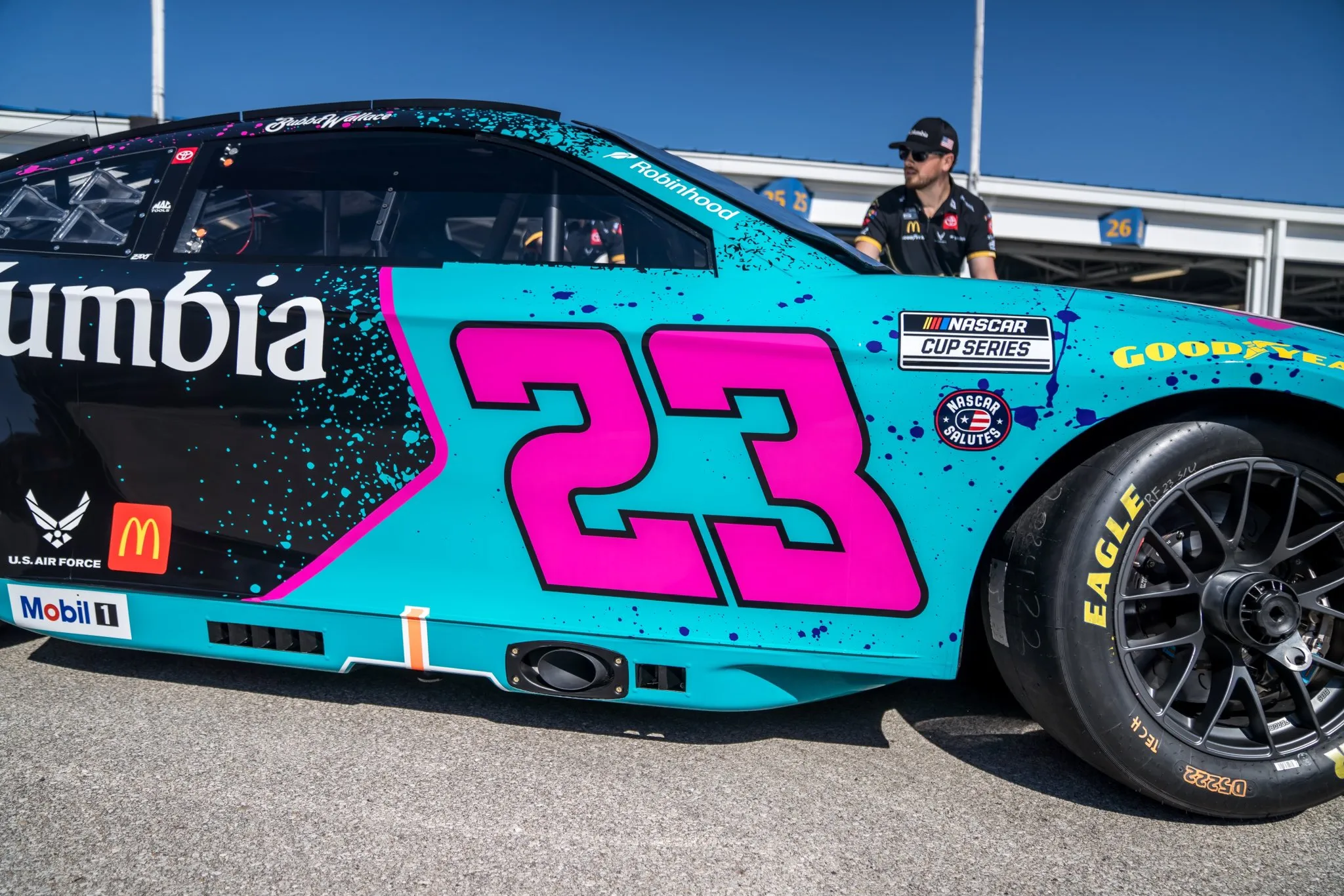
At the heart of the legal war? NASCAR’s charter system, a franchise-style model implemented in 2016 that grants teams guaranteed entry into races and a share of media rights revenue.
Now, both 23XI Racing and Front Row Motorsports are accusing NASCAR of running what they describe as a rigged and restrictive system. According to their lawsuit, the current charter structure not only stifles fair competition but also forces teams into unfavorable agreements under pressure. They argue that NASCAR is leveraging its control to impose renewal terms that effectively eliminate a team’s right to legal recourse — a practice they believe violates federal antitrust laws and the spirit of open-market competition.
“We won’t be strong-armed into surrendering our legal rights just to stay in the game,” one team insider reportedly told
The lawsuit centers around NASCAR’s refusal to renew team charters unless the teams waive their rights to sue — a demand both 23XI and Front Row firmly rejected.
Courtroom Bombshell: Charter Status in Jeopardy
Things escalated fast. In June 2025, a federal appeals court reversed an earlier injunction that had temporarily protected the teams’ charter status. The new ruling shook the garage area: the court decided that if the teams refused to sign NASCAR’s new charter agreements, they could no longer enjoy the benefits of those deals.
“You can’t have it both ways,” Judge Niemeyer wrote. “You cannot reject the contract and demand its privileges.”
That ruling left both 23XI Racing and Front Row Motorsports in imminent danger of losing their charters — a move that would cripple their ability to compete in the 2025 NASCAR Cup Series. Without a charter, they would be relegated to “open team” status — forced to qualify on speed alone, with no guaranteed revenue, no media rights share, and limited sponsor protection.
Emergency Maneuver New Legal Filing Seeks to Block NASCAR Again
But the teams aren’t backing down. On July 14, 23XI Racing and Front Row Motorsports filed a new Motion for Temporary Restraining Order (TRO) and a second Preliminary Injunction, asking the court to immediately block NASCAR from revoking their charters while the full antitrust trial proceeds later this year.
Their new legal action is based on “newly discovered information” revealed during pretrial discovery — including a June 25 letter from NASCAR that allegedly proves NASCAR intends to reclaim and reassign the teams’ charters to other buyers.
“If NASCAR succeeds in doing that, our teams will suffer irreparable harm,” attorney Jeffrey Kessler argued in court filings.
The court has given NASCAR until 5 PM on July 16 to respond — meaning a potentially game-changing decision could come within days that may determine the fate of two of the sport’s most high-profile organizations.
What’s at Stake Billions, Sponsors, & Cup Series Acces
This isn’t just a paper war. If 23XI Racing and Front Row Motorsports lose this legal fight, the consequences are massive — not just for them, but for the entire NASCAR ecosystem:
-
No guaranteed race entries – Without charters, both teams would be forced to qualify each week, risking non-entry at major events in the 2025 NASCAR Cup Series.
-
Loss of sponsor confidence – Key partners like DoorDash, Dr. Pepper, and Monster Energy could withdraw financial support if charter security disappears.
-
Lost revenue streams – Estimated losses range from $8–12 million per charter per year, tied to media rights, purse guarantees, and playoff eligibility.
-
Potential driver exits – Big names like Bubba Wallace and Michael McDowell could seek more stable teams, triggering a driver market shake-up.
And the drama doesn’t stop there. In a bold counterattack, NASCAR has filed its own lawsuit against 23XI and Front Row, alleging that the two teams are working together in a coordinated effort to derail the league’s planned reforms. The countersuit accuses the teams of anti-competitive collusion, claiming their legal actions are not just defensive — but strategically designed to block innovation and preserve their own power.
Adding fuel to the fire, NASCAR is seeking triple financial damages, alleging that the teams engaged in deliberate obstruction and bad faith negotiations that have harmed the league’s ability to evolve.
The Bigger Picture Why the Entire Sport Hangs in the Balance
This lawsuit isn’t just about two teams — it could reshape the entire business model of NASCAR.
If the charter system is ruled anti-competitive, it could trigger a collapse of NASCAR’s franchise structure as we know it.
In that case, NASCAR might be forced to adopt a revenue-sharing model similar to what exists in the NFL or NBA — giving teams greater financial security and collective bargaining power.
Other major organizations — including RFK Racing and Trackhouse Racing — are reportedly watching closely and could join the legal fight, depending on how the courts rule.
At the heart of the debate lies a fundamental question:
Should NASCAR be allowed to control everything — or do teams have a say in their own financial future?
And the ripple effects are already visible. Casual fans are taking notice. Reddit threads, TikTok reactions, and YouTube commentary videos are lighting up — many calling it:
“The most important lawsuit in NASCAR’s modern history.”
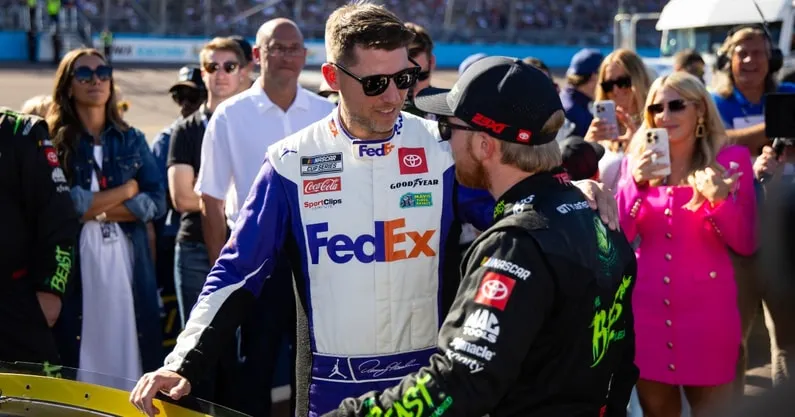
The Race Team Alliance A Hidden Power Behind the Curtain
While 23XI Racing and Front Row Motorsports may be the ones in court, they’re not necessarily acting alone. Both teams are part of a broader coalition of top-tier organizations that have, for years, quietly pushed for a bigger share of NASCAR’s growing revenue pie.
Industry insiders believe this lawsuit could be part of a larger coordinated effort to apply pressure on NASCAR ahead of its next media rights negotiations. There have even been whispers that some teams have explored alternative business models, including independent events or breakaway series outside of NASCAR’s control.
Could this be NASCAR’s version of the Super League saga that shook European soccer?
While nothing official has been announced, the undercurrent of resistance points to a sport at a critical turning point — where ownership groups are beginning to challenge the central power of the sanctioning body like never before.
Countdown to Judgment Day – July 16
With NASCAR required to respond by 5 PM ET on July 16, the clock is ticking. The judge could issue a ruling that same night or within 48 hours — potentially reinstating the charters or confirming their revocation.
And then comes December 2025 — when the full trial will determine whether NASCAR’s business model is legal or fundamentally broken.
FINAL THOUGHT NASCAR’s Moment of Reckoning
This is more than just a high-stakes legal battle — it’s the beginning of a possible revolution in motorsports governance. The outcome won’t just determine the fate of 23XI Racing or Front Row Motorsports — it could permanently alter the power dynamics between teams and the league. Will NASCAR maintain its iron grip over the sport, controlling charters, revenue, and reform from the top down? Or will this be the moment the balance of power shifts toward the very teams who build the cars, hire the drivers, and keep the fans engaged? One thing is clear: no matter how the court rules, NASCAR will never be the same again.








